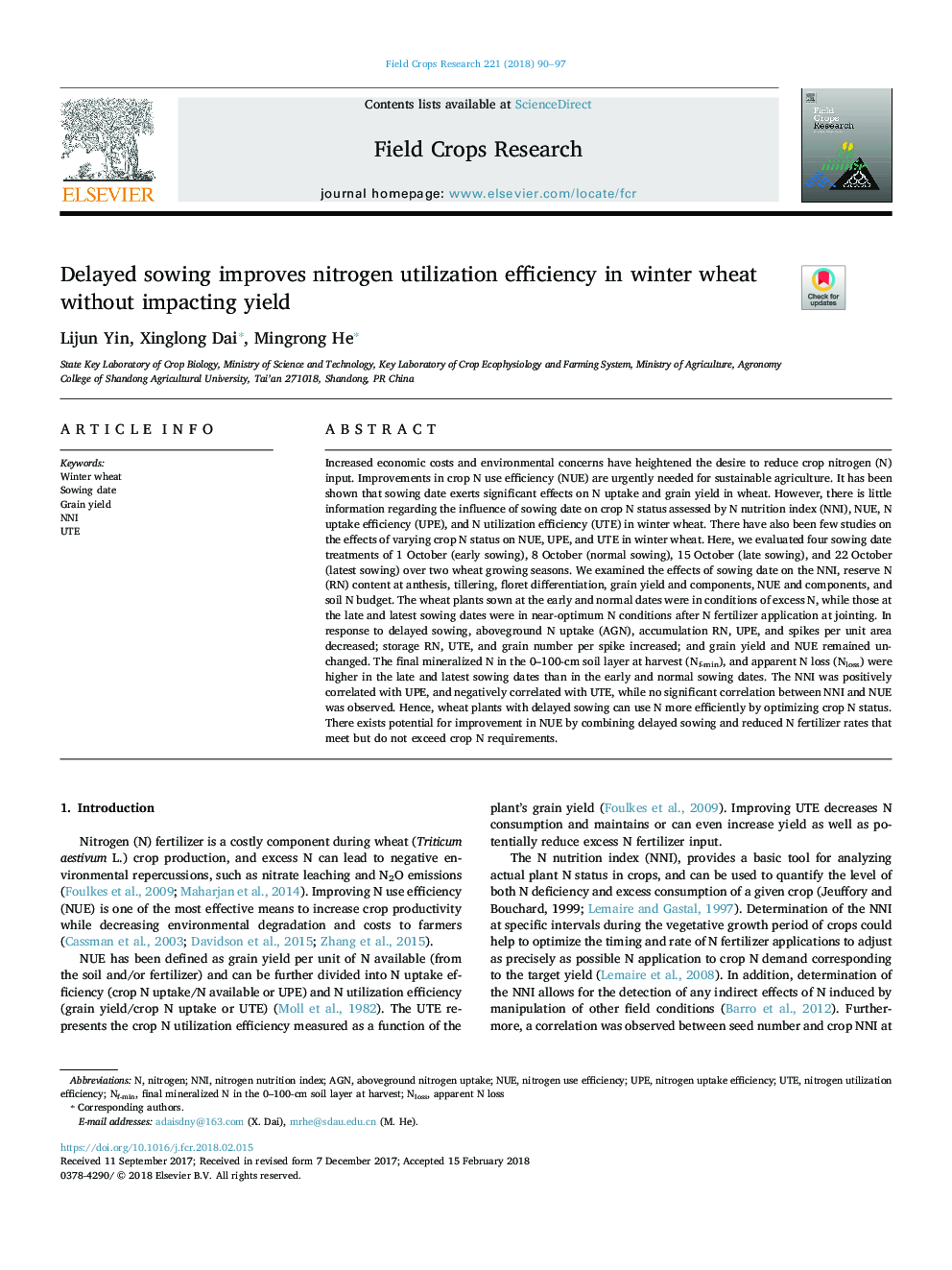| کد مقاله | کد نشریه | سال انتشار | مقاله انگلیسی | نسخه تمام متن |
|---|---|---|---|---|
| 8879230 | 1624642 | 2018 | 8 صفحه PDF | دانلود رایگان |
عنوان انگلیسی مقاله ISI
Delayed sowing improves nitrogen utilization efficiency in winter wheat without impacting yield
ترجمه فارسی عنوان
کاشت تاخیری، بهره وری مصرف نیتروژن در گندم زمستانه بدون تاثیر بر عملکرد را بهبود می
دانلود مقاله + سفارش ترجمه
دانلود مقاله ISI انگلیسی
رایگان برای ایرانیان
کلمات کلیدی
UPENUENNIAGNUTE - OUTNitrogen use efficiency - استفاده از نیتروژن بهره وریNitrogen uptake efficiency - بازده جذب نیتروژنSowing date - تاریخ کاشتNitrogen nutrition index - شاخص تغذیه نیتروژنGrain yield - عملکرد دانهNitrogen - نیتروژنNitrogen utilization efficiency - کارایی مصرف نیتروژنWinter wheat - گندم زمستانه
موضوعات مرتبط
علوم زیستی و بیوفناوری
علوم کشاورزی و بیولوژیک
علوم زراعت و اصلاح نباتات
چکیده انگلیسی
Increased economic costs and environmental concerns have heightened the desire to reduce crop nitrogen (N) input. Improvements in crop N use efficiency (NUE) are urgently needed for sustainable agriculture. It has been shown that sowing date exerts significant effects on N uptake and grain yield in wheat. However, there is little information regarding the influence of sowing date on crop N status assessed by N nutrition index (NNI), NUE, N uptake efficiency (UPE), and N utilization efficiency (UTE) in winter wheat. There have also been few studies on the effects of varying crop N status on NUE, UPE, and UTE in winter wheat. Here, we evaluated four sowing date treatments of 1 October (early sowing), 8 October (normal sowing), 15 October (late sowing), and 22 October (latest sowing) over two wheat growing seasons. We examined the effects of sowing date on the NNI, reserve N (RN) content at anthesis, tillering, floret differentiation, grain yield and components, NUE and components, and soil N budget. The wheat plants sown at the early and normal dates were in conditions of excess N, while those at the late and latest sowing dates were in near-optimum N conditions after N fertilizer application at jointing. In response to delayed sowing, aboveground N uptake (AGN), accumulation RN, UPE, and spikes per unit area decreased; storage RN, UTE, and grain number per spike increased; and grain yield and NUE remained unchanged. The final mineralized N in the 0-100-cm soil layer at harvest (Nf-min), and apparent N loss (Nloss) were higher in the late and latest sowing dates than in the early and normal sowing dates. The NNI was positively correlated with UPE, and negatively correlated with UTE, while no significant correlation between NNI and NUE was observed. Hence, wheat plants with delayed sowing can use N more efficiently by optimizing crop N status. There exists potential for improvement in NUE by combining delayed sowing and reduced N fertilizer rates that meet but do not exceed crop N requirements.
ناشر
Database: Elsevier - ScienceDirect (ساینس دایرکت)
Journal: Field Crops Research - Volume 221, 15 May 2018, Pages 90-97
Journal: Field Crops Research - Volume 221, 15 May 2018, Pages 90-97
نویسندگان
Lijun Yin, Xinglong Dai, Mingrong He,
